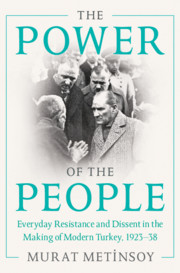Book contents
- The Power of the People
- Maps
- The Power of the People
- Copyright page
- Contents
- Figures
- Acknowledgments
- Introduction
- Part I Everyday Politics of Peasants
- Part II Everyday Politics of Urban Labor
- Part III The Power of Popular Culture
- 10 Hotbeds of Opposition to Secularism
- 11 Informal Media vs. Official Discourse
- 12 Neither Fez Nor Hat
- 13 Negotiating Anti-veiling Campaigns
- 14 Old Habits Die Hard
- Concluding Remarks
- Epilogue
- Notes
- Bibliography
- Index
Epilogue
Infrastructure of Turkey’s Modernization
from Part III - The Power of Popular Culture
Published online by Cambridge University Press: 24 December 2021
- The Power of the People
- Maps
- The Power of the People
- Copyright page
- Contents
- Figures
- Acknowledgments
- Introduction
- Part I Everyday Politics of Peasants
- Part II Everyday Politics of Urban Labor
- Part III The Power of Popular Culture
- 10 Hotbeds of Opposition to Secularism
- 11 Informal Media vs. Official Discourse
- 12 Neither Fez Nor Hat
- 13 Negotiating Anti-veiling Campaigns
- 14 Old Habits Die Hard
- Concluding Remarks
- Epilogue
- Notes
- Bibliography
- Index
Summary
This chapter evaluates the longer-term impact of the people’s politics. The existing literature generally presents the superstructure of Turkey’s modernization by focusing on the state, elite and political organizations. This chapter highlights the alternative view, which this book introduces for the first time, by focusing on the deeper dynamics and bases of modern Turkey’s formation, that is, the infrastructure of Turkey’s modernization. This chapter briefly underlines how each chapter evidences the crucial role of the ordinary people’s views and practices in the implementation of the state’s policies and modernization projects. It argues that Turkey’s socioeconomic and political transformation as envisioned and imposed by republican rulers were limited by the people’s active, daily politics. Underlining how the state and society interacted through hitherto unknown bridges between them, in contrast to widely held theses, it argues the republican regime should not be seen as an elitist or rigid but a flexible and responsive system. One of the main conclusions this study draws is that today’s Turkey was formed by the interaction between state and society rather than top-down creation of the republican elite, and this culminated in today’s upsurge of conservative and Islamist politics. Yet, the book also implies that today’s discontented and disadvantaged individuals could continue to challenge today’s Islamist government in similar ways.
Keywords
- Type
- Chapter
- Information
- The Power of the PeopleEveryday Resistance and Dissent in the Making of Modern Turkey, 1923-38, pp. 286 - 296Publisher: Cambridge University PressPrint publication year: 2021

